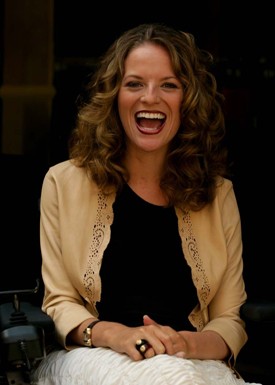Toms River girl one of more than 500 vying for wheelchair accessible van through the nonprofit organization
Lillie Huff can’t move. She can’t speak. And even with her new “coke-bottle glasses,” she can’t see more than shadows.
But she can smile.
And that makes the 3½ -year-old from Toms River a hero to her mother, Rutgers alumna Kristi Calabrese Huff, who graduated from the School of Arts and Sciences in 2000.
“This baby is the most inspiring, strong-willed person I have ever known,” said Huff of her daughter who has massive brain damage stemming from a rare in utero stroke she suffered at 15 weeks. “Through her, we’ve learned to celebrate even the tiniest progress and look forward to more. Because with all of her setbacks, and there are plenty, Lillie keeps on smiling.”
That’s one of the reasons why Huff nominated her daughter for National Mobility Awareness Month’s Local Heroes contest.
Determined to maximize Lillie’s quality of life, Huff also entered Lillie in NMAM’s contest in the hopes of winning a custom Wheelchair Accessible Vehicle, which she will soon require.
“As she gets bigger and heavier, it has become more and more difficult to manage her into and out of her chair and the car,” said Huff, who also has two boys ages, 6, and 8. “Without proper transportation, before long, we’ll be unable to get her to all of her necessary appointments.”
But wheelchair accessible vans don’t come cheap and neither does caring for a sick child.
“I wish I could say we’re in a good place financially, but we’re struggling,” said Huff, whose husband, Daniel is a marine mechanic. “Because of the way she is and the constant care and constant hospitalizations, appointments and therapies, I am unable to work.”
The contest began March 11 and ends May 10 to coordinate with the second annual National Mobility Awareness Month, which is in May. Visitors to NMAM’s website can read the stories of more than 500 “heroes” like Lillie and cast one vote a day to help three win a wheelchair accessible vehicle.
Though the paths that lead to their mobility issues are vastly different, Lillie shares similar transportation needs with NMAM spokesperson Ashley Lauren Fisher.
Fisher was 23 when a playful dive into a wave at the Jersey Shore left her paralyzed.
Although the spinal cord injury she suffered in 1998 stole her ability to move, it in no way crippled the outgoing Montville native.

The model, actress and restaurateur turned heads when she turned Morristown’s failing Pazzo Pazzo into a four-star Italian restaurant after her accident.
Also regarded as a philanthropist and longtime champion of spinal cord research, Fisher crossed paths with Rutgers’ Wise Young when Christopher and Dana Reeve introduced her to the doctor she would come to admire. In 2007 Fisher raised funds for Young’s Spinal Cord Injury Project at Rutgers through a fashion event organized by Discovery Through Design, the nonprofit she co-founded.
But as much as Fisher, 38, refuses to be defined by her disability, she is acutely aware of the impact mobility issues can have on someone’s life.
Through her role as a NMAM spokesperson, Fisher strives to shine a light on the 18 million people in the United States and Canada, who like her, struggle with mobility issues daily.
“I think it’s a great initiative to celebrate those with disabilities and help them at the same time. It’s long over due,“ said Fisher of the nonprofit organization dedicated to showing the world how people with disabilities can live active, mobile lifestyles. “We’re the largest minority group in the U.S.”
In addition to survivors of spinal cord injury such as Fisher, that group includes veterans, the elderly and children like Lillie.
And Fisher knows the difference the right vehicle could make in Lillie and her mom’s life.
“This (van) will allow Lillie’s mom to be a mom and get her around and do the things that would be an hour more consuming,” Fisher said. “We don’t stay little forever. You can’t cage us, we’re not animals.”
The contest is NMAM’s way to help a few families in need, said Fisher, and, in the process, raise awareness about mobility issues.
“They want people to be aware so they can be advocates on the education of mobility issues,” Fisher said. “We’re looking to educate all those involved on the access to mobility resources to give them a better richer life. That’s why I’m involved.”